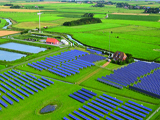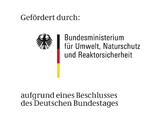SmartRegion Pellworm
Small island is counting on renewable energy
The 1200 inhabitants strong island of Pellworm is resting modestly in Germany's North Sea, even though it is achieving something that most metropolitan areas are still dreaming of. Pellworm's share of renewable energy sources is already today compliant with the Energy Concept 2050. With more than 21 gigawatt hours, the island is producing three times as much electricity as it is consuming every year. In spite of the excess production, the community is dependent on the connection to the mainland's grid via two 20‐kilovolt‐undersea cables. The group project "SmartRegion Pellworm" wants to energetically bring together power generation and power consumption on-site. For this, Fraunhofer UMSICHT is preparing a heat demand prognosis for flexibly rechargeable electric storage heaters that can serve as electrical storage in case of an excess of renewable energy.
On Pellworm, in addition to wind energy, photo voltaics and a biogas plant, numerous electric storage heaters and heat pumps are found. In addition, there will be - in the future - battery storage systems as well as intelligent energy meters, so-called smart meters, that reveal to users their actual consumption and their usage periods. This combination of renewable energies, different energy storage systems and intelligent meter technology is to serve as basis for a stable and cost-efficient electricity supply in the "SmartRegion Pellworm" group project. Fraunhofer UMSICHT scientist, Dipl.-Wirt.-Ing. Michael Metz, explains: "Different storage technologies and controllable consumers constitute a compensation option on Pellworm for varying wind and solar power generation. Through them, the regional supply task can be fulfilled in the future, so that Pellworm will be, for the most part, autonomous with respect to power consumption. In the project, we are dealing with the development of a model for the utilization of electric storage heaters as flexible loads."
Heat demand prognosis for electric storage heaters
Normally, electric storage heaters consume power at night by which storage bricks inside the heater are heated. During the day, when the demand for heat is highest, the storage bricks release the heat again. The storage capability of the devices makes it possible to postpone the charging point in time within reasonable parameters. This has the advantage that it is possible to react to the availability of renewable energies without affecting the provision of heat in rooms. "The charging is to primarily take place when a lot of renewably generated power is fed into the grid. The prerequisite for the intelligent control of power consumers and power generators that are coordinated with one another are reliable feed and demand prognoses," explains Maike Hasselmann, M. Sc., from the Division Energy. For electric storage heaters, Fraunhofer UMSICHT is developing for this a module for the prognosis of the heat demand. The prognosis makes it possible to integrate more electricity from renewable energies and, at the same time, cover the heat demand at any given point in time. "Taking into consideration the outdoor temperature, we project the heat demand and/or to what degree the heaters have to be charged minimally as well as how much would be maximally possible." The experience gained from the implementation and operation as well as the inspection of the business models are then to be included in the analysis of the transferability of the Pellworm approach to other regions of the grid.
The island is celebrating the start of the "SmartRegion Pellworm" project on September 9th. "SmartRegion Pellworm" is one of six lighthouse projects of the storage initiative of the German Federal Ministries of Economics and Technology, of Education and Research as well as the German Federal Ministry of the Environment, Nature Conservation and Nuclear Safety and is undertaken by a broadly positioned innovation group from industry and science.
Project partners
E.ON AG
Fachhochschule Westküste
Fraunhofer Gesellschaft zur Förderung angewandter Forschung e.V.
Gustav Klein GmbH & Co. KG
Rheinisch-Westfälische Technische Hochschule Aachen
Saft Batterien GmbH
Schleswig-Holstein Netz AG
Sponsor
Sponsored by the German Federal Ministry of the Environment, Nature Conservation and Nuclear Safety, based on a decision by the Lower House of the German Parliament (Bundestag).
Last modified:
 Fraunhofer Institute for Environmental, Safety and Energy Technology UMSICHT
Fraunhofer Institute for Environmental, Safety and Energy Technology UMSICHT

